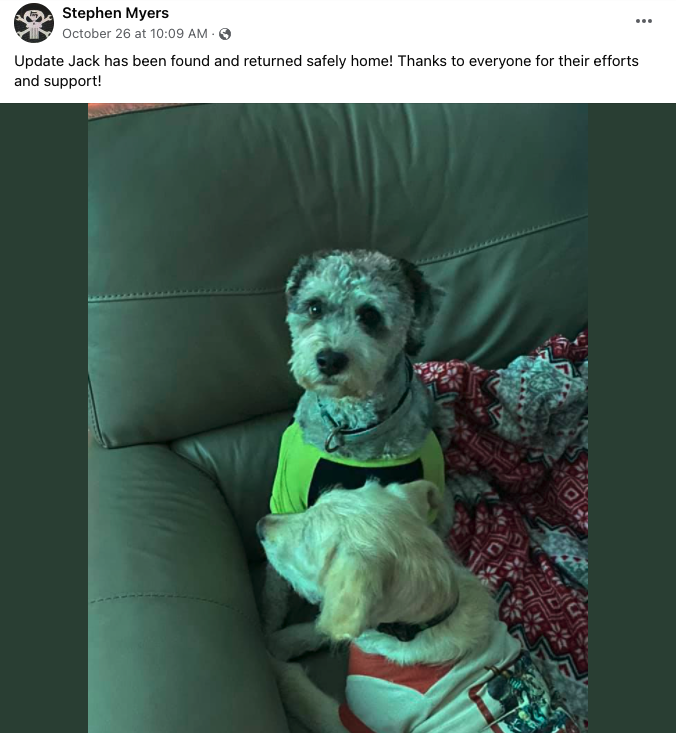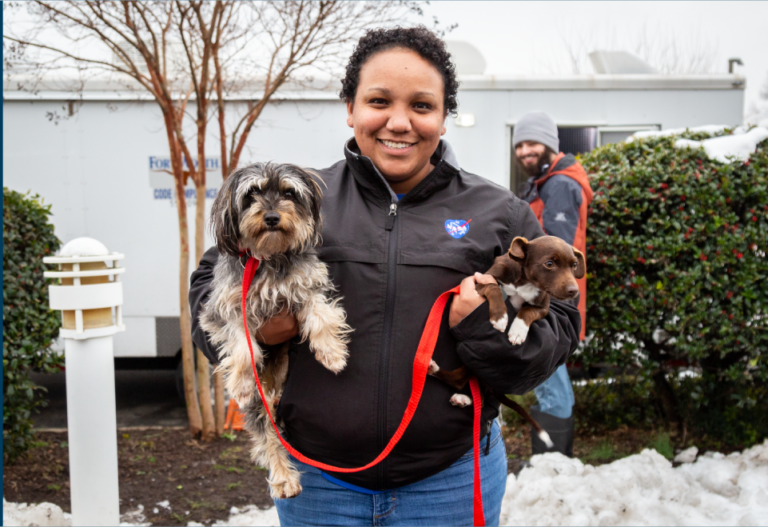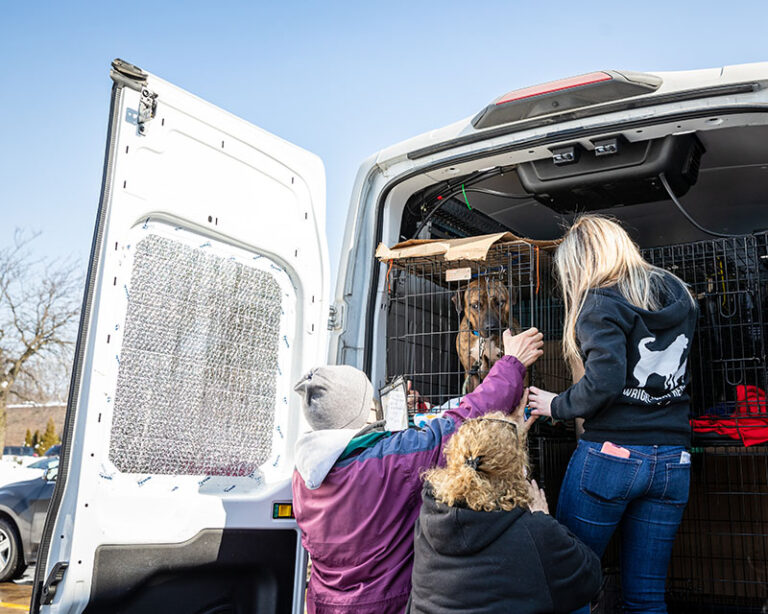“Most of my time my free time is spent on social media,” says Tucson resident Tanya Gutierrez.
Universal story, right? Only while so many of us are idly scrolling, Tanya is online with a serious purpose as a volunteer pet detective with Pima Animal Care Center‘s Lost and Found program.
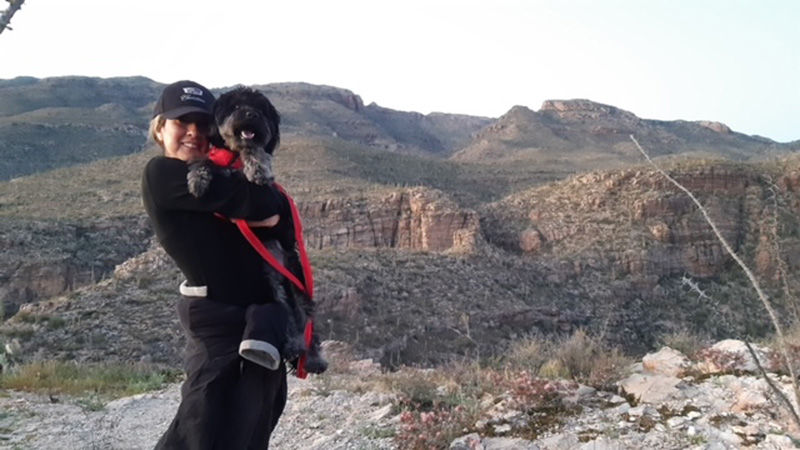
Tanya has been volunteering as a pet detective for about five years (through PACC, and with another non-affiliated group that tracks and traps loose pets in addition to using social media).
She estimates in that time she’s helped reunite over 200 pets with their families.

To make that happen, Tanya scours Craigslist, PawBoost, Facebook, Nextdoor, Twitter, and other online platforms searching for reports of pets who are lost, and those who are found, then matching them up to get the pets back home.
Her phone and computer are full of screenshotted posts. She has a great memory for dogs, and a great dedication to helping lost dogs not be lost anymore. She is bilingual—fluent in English and Spanish—which further expands the reach of her help.
“It’s a lot of hours a week because since it’s easy to access stuff on your phone, and so when I’m on my free time I just go on my phone and start,” Tanya says. “Even when I’m on the internet for myself personally, I’ll go onto Facebook because my Facebook feeds are just full of lost and found dogs.”
PACC is not the only animal shelter with a volunteer pet detective program—and no wonder. At most animal shelters, strays make up the majority of animals coming in.
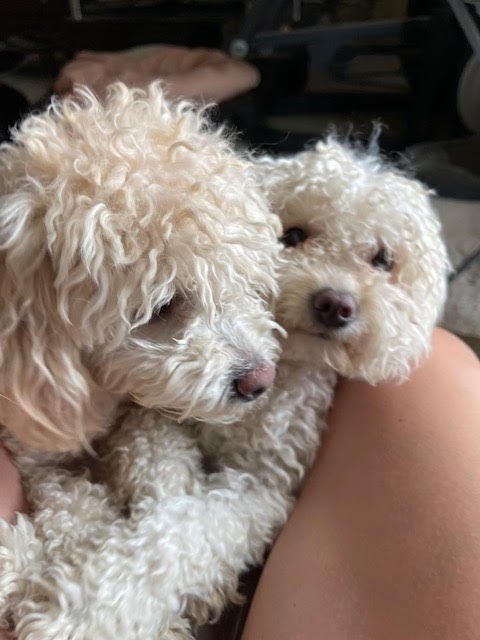
So pet reunification programs are not just a key tool to keep people and pets together, but also represent an important way to make sure owned animals aren’t needlessly in the shelter at all.
Heidi Mitchell, social media coordinator for Guilford County Animal Services, in North Carolina, decided to start a pet detective program this past April. She came up with the idea one morning while looking at all the many postings about lost and found pets on her neighborhood Nextdoor page.
While Heidi is well positioned to help many of those pets get home to their owners, that morning she got to thinking: Wouldn’t it be better if there were more people engaged in this pursuit?
And wouldn’t a more centralized way to keep track of which pets were missing and which had been found make the process more efficient and effective?
Heidi approached her community engagement manager, and said she wanted to try creating a platform for lost and found pet posts, and a program for volunteers to use their computer skills in aiding these pets home to their families.
She pitched a great idea for what to call the volunteers, too: “The Pet Detective Program, because they’re going to be helping look for lost and found dogs,” Heidi recalls. She got an enthusiastic, “Let’s go for it!” in return.
GCAS ran a test program with five volunteers for about a month before officially launching the Pet Detectives Facebook page and volunteer group—which today, has grown to 62 active pet detective volunteers. (And has a terrific logo.)

“We really invite anyone to come in. Anyone is welcome to come in and look at our page and look for lost pets on their time,” says Heidi.
On top of the practical effect of reuniting pets with families, Heidi reflects that having this program run through the county shelter also helps build trust and goodwill.
“It’s showing that we really do care about the pets, even if they’re not in our facility, we care about the pets in our community. And that’s gone a long way with the community as well.”
Heidi Mitchell, Guilford County Animal Services
At Pima Animal Care Center, Lost and Found volunteers help out in a number of ways: Some manage the reports of lost and found pets; one is in charge of maintaining the online system where these reports are tracked (PACC’s Lost and Found group uses the project management app Trello).
There are volunteers—including Tanya—who put up physical lost and found pet posters, and put the posters up on social media.
The most accessible volunteer opportunity is the online pet detective work. Jennifer Handlin, PACC’s lost and found specialist, says that part of the program was expanded during Covid, when “we had a ton of our volunteers who wanted to help who couldn’t come to the shelter.”
What started as a necessity turned out to be a real boon to volunteer participation.
“They can sit in their living room at midnight and run through all these things as opposed to waiting until we’re open and maybe not having the time to do that,” Jennifer says. “I do recommend it if you want to get a bigger pool of volunteers to help you. More eyes on the situation, for sure.”
Those eyes recently got a lost dog named Tomas back to his family.
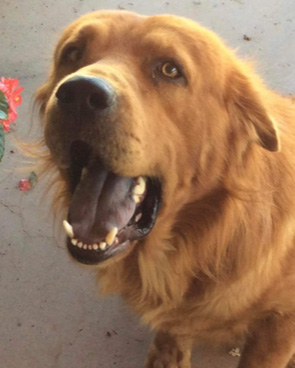
Tomas came to PACC after getting lost. His family did not post to social media, until his stray hold was up—that’s the time during which a stray pet must be held by the shelter, by law, to give their family a chance to find and reclaim them—and by then he had been placed with a rescue group for adoption.
But once Tomas’s family did take to the internet, Tanya recognized the dog. She reached out to the rescue group Tomas had been placed with. They agreed to return Tomas to his family.
“And then when I finally connected them together, the rescue told me last night that the owner was crying because he’s got his dog back. He couldn’t believe it,” Tanya says.
With all those hours, looking for all those missing pets, Tanya’s pet detective work can be very stressful. But she and her fellow pet detectives keep going, hour after hour, day after day, click after click, because of the dogs like Tomas, and their families.
“If it was me and my dog was lost, my dog would love all the help,” Tanya says. “And I’m grateful that there’s all these social media sites and everywhere to match up dogs. And I’m grateful for other people that like to match up dogs.”
Would you like to try setting up a volunteer pet detective program at your shelter? Here are some tips!
- First, check out the HASS Lost Pet Reunification toolkit, which has tons of great information for shelters about how to help get lost pets back home—including why it’s so important to have a lost and found pet coordinator on staff.
- Jennifer Handlin is a fan of automating as much of the lost and found process as possible. PACC uses a text system—info about it is up on their website—so people with lost pets can text one number to get links to file a report about a lost pet and view the pets who are in the shelter; there’s another number to report found pets.
- For shelters starting a pet detectives Facebook page, Heidi Mitchell recommends using a template for lost and found posts—and putting one or more volunteers in charge of editing and approving posts, to ensure they comply with your rules and standards.
This is the template GCAS uses for lost pet posts:
Courtesy Lost Dog Post
The following pet was reported missing. This pet is not at our facility. This courtesy listing for the owner per their lost pet report. UPDATE: REUNITED
If you have any information about this lost pet, please contact the Guilford County Animal Services!
Date and Time Pet was Lost:
Street/location Pet Was Lost:
City Pet Was Lost:
Pet’s Name:
Pet’s Age:
Pet’s Sex:
Breed:
Describe Your Pet:
Describe Items with Pet:
Is your pet microchipped?:
Pet’s Known Medical Conditions:
If you have any information about this pet at all, please contact us to connect you to the owner. Thank you, Pet Detectives!
And this is their found pet template:
Courtesy Found Dog Report
This pet is not at Guilford County Animal Services. This is a Found Pet Report that came into our facility. If this is your missing pet, please contact us to get in touch with the finder.
—————
Date the Pet Was Found:
Street or Area Where the Pet Was Found:
Pet’s Sex:
Breed: Mix?
Approximate Age:
Pet’s Color:
Pet was found with the following items:
Notes:
Both templates can be modified for cats.
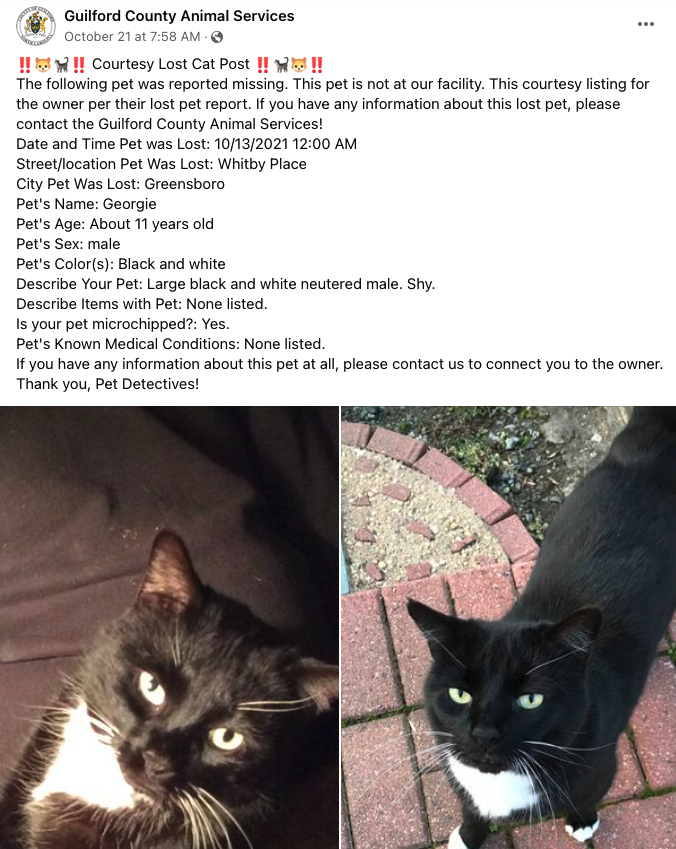
- Heidi also advises thinking about branding and marketing. “I definitely would recommend getting a neat name, making a cute image,” she says. “We have a little detective badge we send out to people that people really like and they think it’s silly and fun.”
- We couldn’t write about pet detectives without reaching out to Kimberley Freeman, an expert in finding lost cats. You can read some of her incredible reunification stories here.
Kimberley has a host of really great tools and resources on her website. She also offered the important tip, that for anyone who is looking for a lost pet in the field (not just online): “DO NOT CHASE!”
“This is human nature and typically makes the situation worse and pushes an already stressed animal from where they may have felt safe into running farther away and into possible danger,” she says.
Kimberley also shared this picture of a lost tortoise named Lightning Bolt she tracked down and reunited with his family:
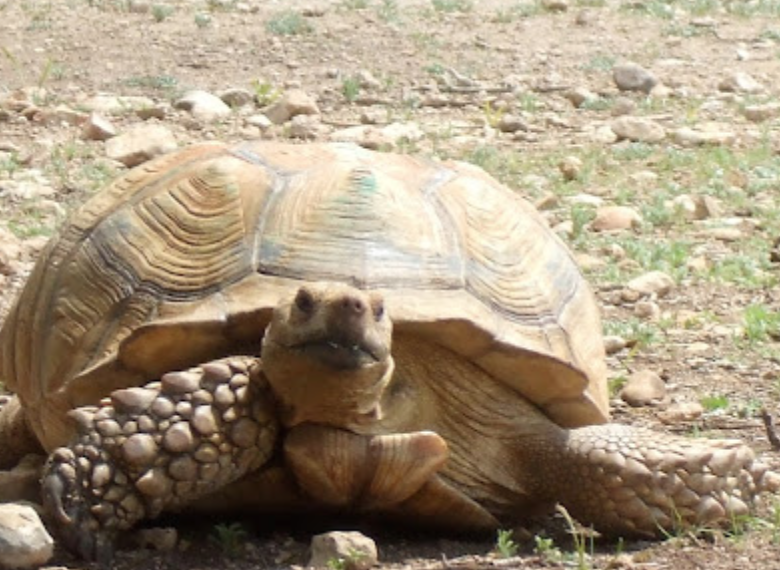
“He had dug under a fence at an alpaca farm and took off,” she says. “I tracked him through the pasture, down a hill, and found him over-turned in a dry creek bed. The owners came in their golf cart, and after a lot of effort (he weighed nearly 200lbs) we got him back on his feet and into the golf cart to go home for a bath to rehydrate.”
We are always looking for Steal This Idea ideas! Reach out and tell us the creative, innovative ways your shelter is keeping people and pets together, and saving animals’ lives.

